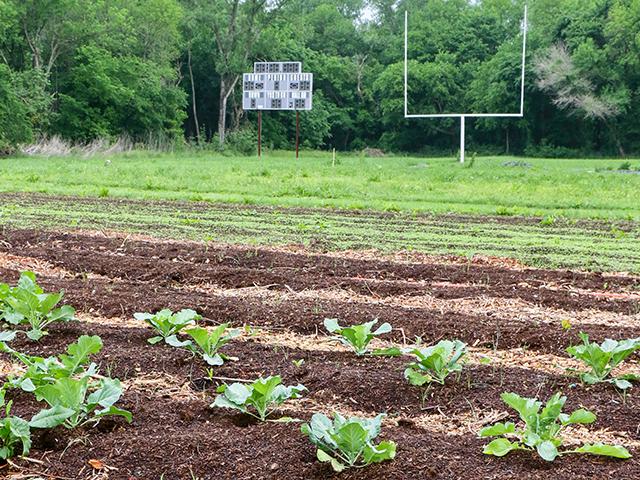Gridiron to Groceries
Small Texas College Converts Its Football Field Into Small Farm to Grow Produce for a Food Desert
A Chicago city girl through and through, Angel Potts can still scarcely believe she's into her third year working at WE Over Me Farm, the agricultural operation that has taken over the former football field at Paul Quinn College, in Dallas.
On a humid, overcast morning, Potts is checking some early-season arrivals -- the turnips -- and reveling in the journey that brought her to this several-acre plot in Texas that still features goalposts and a scoreboard that haven't been used in a decade.
"I never imagined myself out digging in the dirt with bugs crawling around," said Potts, a junior majoring in communications. "I first came to this field with a friend as a freshman," she said. "She had some vegetables growing here she was checking on. This place spoke to me. I was sold on the whole thing."
FOOTBALL TO FARM
That a farm on campus could serve the community as well as students was part of the vision by Paul Quinn President Michael Sorrell, who came to the school in 2007. The college was in precarious financial straits, and a not-so-good football team only added to the drain. He made the difficult decision in 2010 to discontinue the sport, but that left the school with an unused 5-acre plot of land.
The idea of transforming the gridiron into a farm came about from discussions between school officials and community leaders. The school is in Highland Hills, an area of south Dallas known as a food desert, owing to the lack of full-service grocery stores and farmers' markets.
P[L1] D[0x0] M[300x250] OOP[F] ADUNIT[] T[]
The group envisioned WE Over Me Farm to produce crops that would be sold but also given away in the community. In the process, students could learn about agriculture by doing most of the work on the farm. Paul Quinn, the oldest Historically Black College west of the Mississippi River, is also one of eight unique "work colleges" in the U.S., where every student has a campus job to lower the cost of tuition.
Paul Quinn College doesn't have an agricultural or horticultural curriculum to help drive crop decisions. Apparently, that wasn't a deterrent. Staff at the school, Sorrell explains, literally began the project by googling, "What crops grow in Dallas?"
"There's nothing more audacious," Sorrell said, "than a group of people who have zero previous knowledge or history or experience, having success turning a football field into a farm and it working. But now we have a legit farming operation on 5 acres of land."
Sure enough. WE Over Me Farm (the motto is that of the school as a whole) now gives away 10% to 15% of its production via aid organizations in addition to selling produce at area farmers' markets. In its highest-profile success, the farm became a provider of produce to hospitality group AT&T Legends, the food service group at the NFL's Dallas Cowboy football games and the practice facility for the Dallas Stars of the National Hockey League.
Partly in response to its expanded client base, the college is ramping up more production by building and using more raised beds, high tunnels and a 3,000-square-foot greenhouse with an aquaponic growing system.
TRIAL AND ERROR
This is not to say the process has been easy. "There has been a high learning curve for farming at the school," said Harrison Coleman, assistant farm manager. "Lettuce doesn't grow in the middle of summer, especially in Texas," he said. "Most professional advice guides are geared to growing in the Midwest and the Northeast, not a place with regular 100-degree-Fahrenheit temperatures."
Coleman, an avid gardener who previously worked in corporate sales, joined the farm as its only full-time employee as the pandemic was beginning in 2020. The resulting loss of on-campus students created a labor shortage on the farm. Most students remained at home in the fall of 2021.
The lack of workers is especially difficult given that the farm is trying to minimize or eliminate chemical use. "In the typical backyard garden, you can handle weeding everything by hand," Coleman said. "This is quite a bit more, with only two of us working regularly right now. We're now covering more ground around the plants with plastic to deter weeds."
The lack of workers has also affected how much they grow. "We've kind of condensed things for now," he continued. "Instead of trying to grow nearly 15 different crops, we've scaled back to tomatoes, cucumbers, jalapenos, collard greens, lettuce and sweet potatoes."
Perhaps not surprisingly, the farm is divided into "four quarters" that feature both in-ground plants and some raised beds. Until there are more students on campus, Coleman and Potts are only using the first quarter for growing, in addition to the high tunnel and greenhouse. Despite the pandemic-driven pullback, WE Over Me Farm products remain in high demand. Their collard greens are highly regarded by AT&T Legends, and they simply can't grow enough sweet potatoes to satisfy demand at the holidays.
Certainly, the experience has affected Coleman and Potts. Coleman now plans to enroll at a local community college's two-year urban sustainable agriculture program.
"I'd love to keep working here while I take classes," he said. "I think everyone should know how to plant their own food. This should be an essential thing."
Potts agrees. "This farm brought peace to me when life seemed so stressful and crazy. I learned about the healing powers of the earth."
(c) Copyright 2022 DTN, LLC. All rights reserved.




